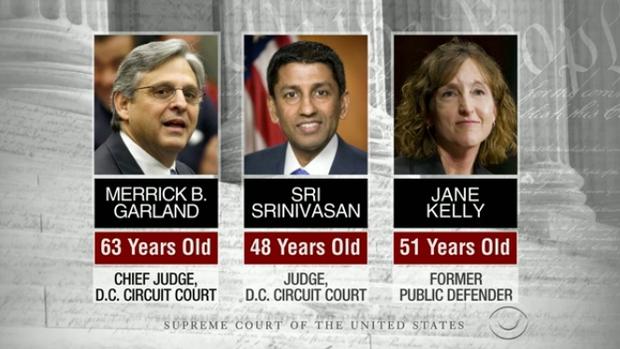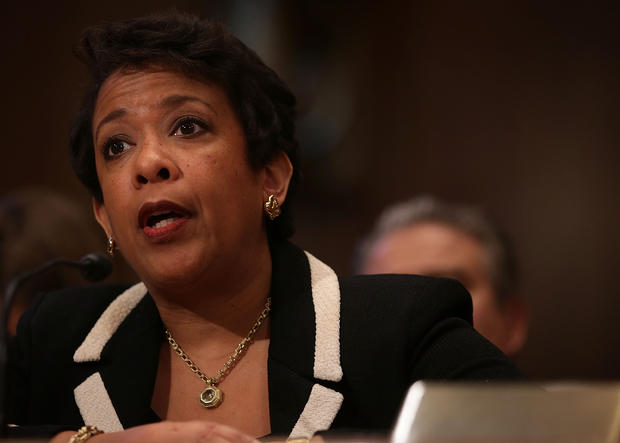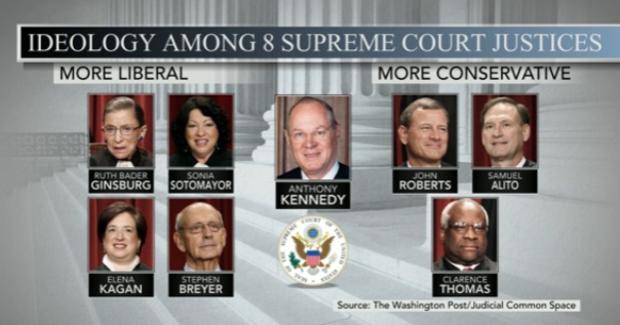Who are the potential nominees to replace Scalia?
WASHINGTON, D.C. -- On Monday, President Obama was discussing privately who will be his next pick for the Supreme Court. It would be his third.
Margaret Brennan was with the president at a Southeast Asian summit meeting he was hosting in Rancho Mirage, California.
Mr. Obama could make his pick as soon as next week, but election year politics in an already divided Washington make his decision complicated.
The president will need at least 14 Republican senators to move the process forward. To help win some Republican backing, Mr. Obama could choose a candidate who has already won senate approval.
Some names that fit that bill: Sixty-three-year-old Merrick Garland, the chief judge on the D.C. Circuit Court. Or Sri Srinivasan, 48, who also sits on that court. Srinivasan would be the first Indian-American Justice. Or 51-year-old former public defender Jane Kelly, a Harvard Law classmate of the president.
Or Mr. Obama could make a bold choice like Attorney General Loretta Lynch, who had to wait more than 160 days before she was confirmed for her current position.
The administration argues that history is on its side and points to the confirmation of Justice Anthony Kennedy as an example. Nominated by President Reagan, Kennedy was confirmed during the 1988 election year by a Democratic Senate.
Of course in that case it took three tries before the president's pick actually won confirmation. The White House has already started calling on Democrats and Republicans in Congress to try to grease the wheels for their nominee.
In fact, it would be rare for the Senate to turn the president down even in an election year. In the 20th Century, the Senate voted on seven Supreme Court nominees in election years. And it approved all but one. Nancy Cordes is on Capitol Hill.
It took roughly three hours for Scalia's passing to become a major campaign issue.
"The president under our constitution has a duty to send forth a name to be considered by the Senate. And the Senate has a duty to consider that," said Hillary Clinton.
On Capitol Hill, Republicans on the pivotal Senate Judiciary Committee -- from Ted Cruz to Lindsey Graham -- vowed to block virtually any nominee, calling the president a lame duck.
"This will probably be left up to the next president," Graham said.
Democrats like New York's Chuck Schumer argued President Obama still has nearly a year left in his term.
"When you go right off the bat and say, I don't care who he nominates," said Schumer. "I am going to oppose him, that's not going to fly."
But Schumer felt differently in the final year of President George W. Bush's term when he argued Democrats should block Bush nominees because the Supreme Court was already "dangerously out of balance."
There isn't much precedent for a fight like this. Congress has never taken more than 125 days to vote on a Supreme Court nominee. But legal scholar Jonathan Turley said this time could be different.
"Conservatives clearly despise President Obama and they revere Justice Scalia," he said. "It's a bad mix. So you will have a battle royale no matter who is appointed."
Some Republicans have told Cordes they would be open to considering what they called a "consensus choice."
But they also couldn't name anyone who might fit that description, because even a moderate nominee would pull the court to the left of where it was.


